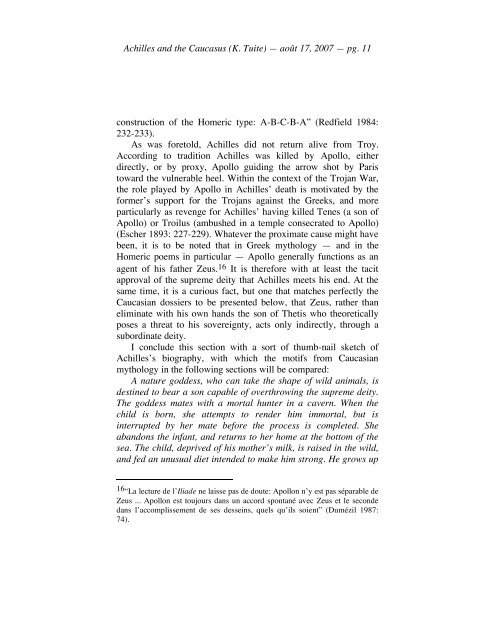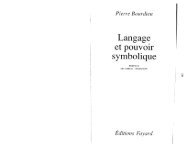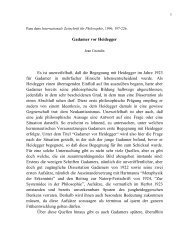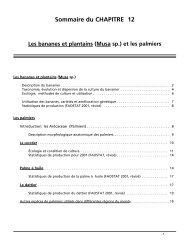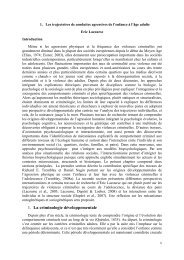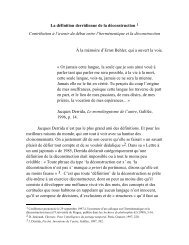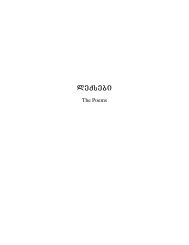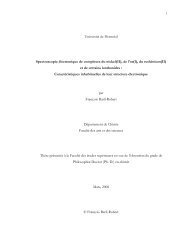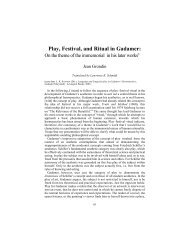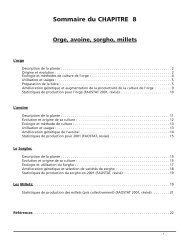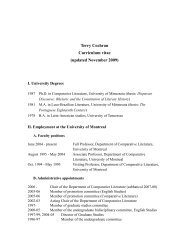Achilles and the Caucasus - Université de Montréal
Achilles and the Caucasus - Université de Montréal
Achilles and the Caucasus - Université de Montréal
You also want an ePaper? Increase the reach of your titles
YUMPU automatically turns print PDFs into web optimized ePapers that Google loves.
<strong>Achilles</strong> <strong>and</strong> <strong>the</strong> <strong>Caucasus</strong> (K. Tuite) — août 17, 2007 — pg. 11<br />
construction of <strong>the</strong> Homeric type: A-B-C-B-A” (Redfield 1984:<br />
232-233).<br />
As was foretold, <strong>Achilles</strong> did not return alive from Troy.<br />
According to tradition <strong>Achilles</strong> was killed by Apollo, ei<strong>the</strong>r<br />
directly, or by proxy, Apollo guiding <strong>the</strong> arrow shot by Paris<br />
toward <strong>the</strong> vulnerable heel. Within <strong>the</strong> context of <strong>the</strong> Trojan War,<br />
<strong>the</strong> role played by Apollo in <strong>Achilles</strong>’ <strong>de</strong>ath is motivated by <strong>the</strong><br />
former’s support for <strong>the</strong> Trojans against <strong>the</strong> Greeks, <strong>and</strong> more<br />
particularly as revenge for <strong>Achilles</strong>’ having killed Tenes (a son of<br />
Apollo) or Troilus (ambushed in a temple consecrated to Apollo)<br />
(Escher 1893: 227-229). Whatever <strong>the</strong> proximate cause might have<br />
been, it is to be noted that in Greek mythology — <strong>and</strong> in <strong>the</strong><br />
Homeric poems in particular — Apollo generally functions as an<br />
agent of his fa<strong>the</strong>r Zeus. 16 It is <strong>the</strong>refore with at least <strong>the</strong> tacit<br />
approval of <strong>the</strong> supreme <strong>de</strong>ity that <strong>Achilles</strong> meets his end. At <strong>the</strong><br />
same time, it is a curious fact, but one that matches perfectly <strong>the</strong><br />
Caucasian dossiers to be presented below, that Zeus, ra<strong>the</strong>r than<br />
eliminate with his own h<strong>and</strong>s <strong>the</strong> son of Thetis who <strong>the</strong>oretically<br />
poses a threat to his sovereignty, acts only indirectly, through a<br />
subordinate <strong>de</strong>ity.<br />
I conclu<strong>de</strong> this section with a sort of thumb-nail sketch of<br />
<strong>Achilles</strong>’s biography, with which <strong>the</strong> motifs from Caucasian<br />
mythology in <strong>the</strong> following sections will be compared:<br />
A nature god<strong>de</strong>ss, who can take <strong>the</strong> shape of wild animals, is<br />
<strong>de</strong>stined to bear a son capable of overthrowing <strong>the</strong> supreme <strong>de</strong>ity.<br />
The god<strong>de</strong>ss mates with a mortal hunter in a cavern. When <strong>the</strong><br />
child is born, she attempts to ren<strong>de</strong>r him immortal, but is<br />
interrupted by her mate before <strong>the</strong> process is completed. She<br />
ab<strong>and</strong>ons <strong>the</strong> infant, <strong>and</strong> returns to her home at <strong>the</strong> bottom of <strong>the</strong><br />
sea. The child, <strong>de</strong>prived of his mo<strong>the</strong>r’s milk, is raised in <strong>the</strong> wild,<br />
<strong>and</strong> fed an unusual diet inten<strong>de</strong>d to make him strong. He grows up<br />
16 “La lecture <strong>de</strong> l’Ilia<strong>de</strong> ne laisse pas <strong>de</strong> doute: Apollon n’y est pas séparable <strong>de</strong><br />
Zeus ... Apollon est toujours dans un accord spontané avec Zeus et le secon<strong>de</strong><br />
dans l’accomplissement <strong>de</strong> ses <strong>de</strong>sseins, quels qu’ils soient” (Dumézil 1987:<br />
74).


